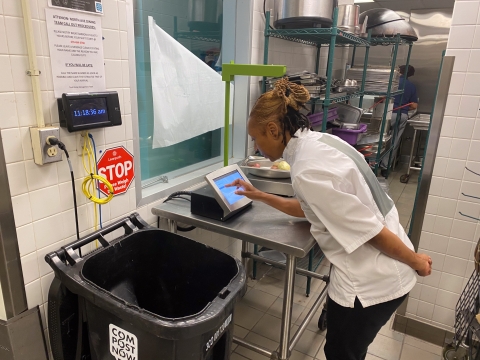Georgia Tech's Dining Services has taken significant strides to minimize food waste on campus. By implementing programs like LeanPath and Raccoon Eyes, they are bringing awareness and actively engaging in sustainable practices beneficial to the campus community and planet.
In today's society, where sustainability and environmental consciousness are at the forefront of our concerns, Georgia Tech's Dining Services, within the cabinet area of Student Engagement and Well-being has taken significant strides to minimize food waste on campus. By implementing programs like LeanPath and Raccoon Eyes, they are bringing awareness and actively engaging in sustainable practices beneficial to the campus community and planet. “Today’s Georgia Tech Dining program cannot simply produce quality food at a competitive price,” said Ryan Greene, Executive Director of Dining and Retail. “It must operate with sustainable practices at the forefront, helping the institute meet its goal of zero waste as quickly as possible. For Tech Dining, the most exciting aspect of our sustainable priorities include innovation and technology, which closely align with Georgia Tech’s strategic plan.” LeanPath is instrumental in monitoring pre-consumer (kitchen) waste, providing important data on food wastage patterns and trends. One of its key features is the ability to train staff in effective food waste reduction strategies, empowering them to make informed decisions that contribute to waste reduction. By utilizing LeanPath, Tech Dining has reduced its overall carbon footprint by minimizing food usage.Since the implementation of LeanPath in each dining hall in May 2022, Tech Dining has:
- Trained and developed staff in practices to reduce food waste.
- Prevented $2,514 of food waste from occurring in 2023.
Alongside the LeanPath program is Raccoon Eyes, a visionary initiative founded by Georgia Tech students. Utilized in each dining hall, Raccoon Eyes presents students with visuals of the food they waste as they dispose of it. This visual approach educates students about the impact of their actions and fosters a culture of responsibility toward food usage and waste reduction. Powered by vision and AI capabilities, the program streamlines feedback and analytics without the need for manual inputs or tedious processes. Since implementation, Racoon Eyes has:
- Recorded over 51,015 lbs. of post-consumer waste.
- Received 60,524 comments from students about their meals.
- Helped managers on-site identify the top wasted food items so the chefs could adjust menus and recipes.
- Helped managers identify the times of day when the most food is wasted. For lunch, it is between 12 p.m. and 1 p.m. and for dinner, it is between 7 p.m. and 9 p.m.
Georgia Tech's Dining Services is taking the charge of sustainable food practices through initiatives like LeanPath and Raccoon Eyes. By leveraging technology, data-driven insights, and a commitment to environmental stewardship, they are setting a powerful example for other campuses and communities. To learn more about Tech Dining's sustainability efforts, please visit https://dining.gatech.edu/sustainability.
